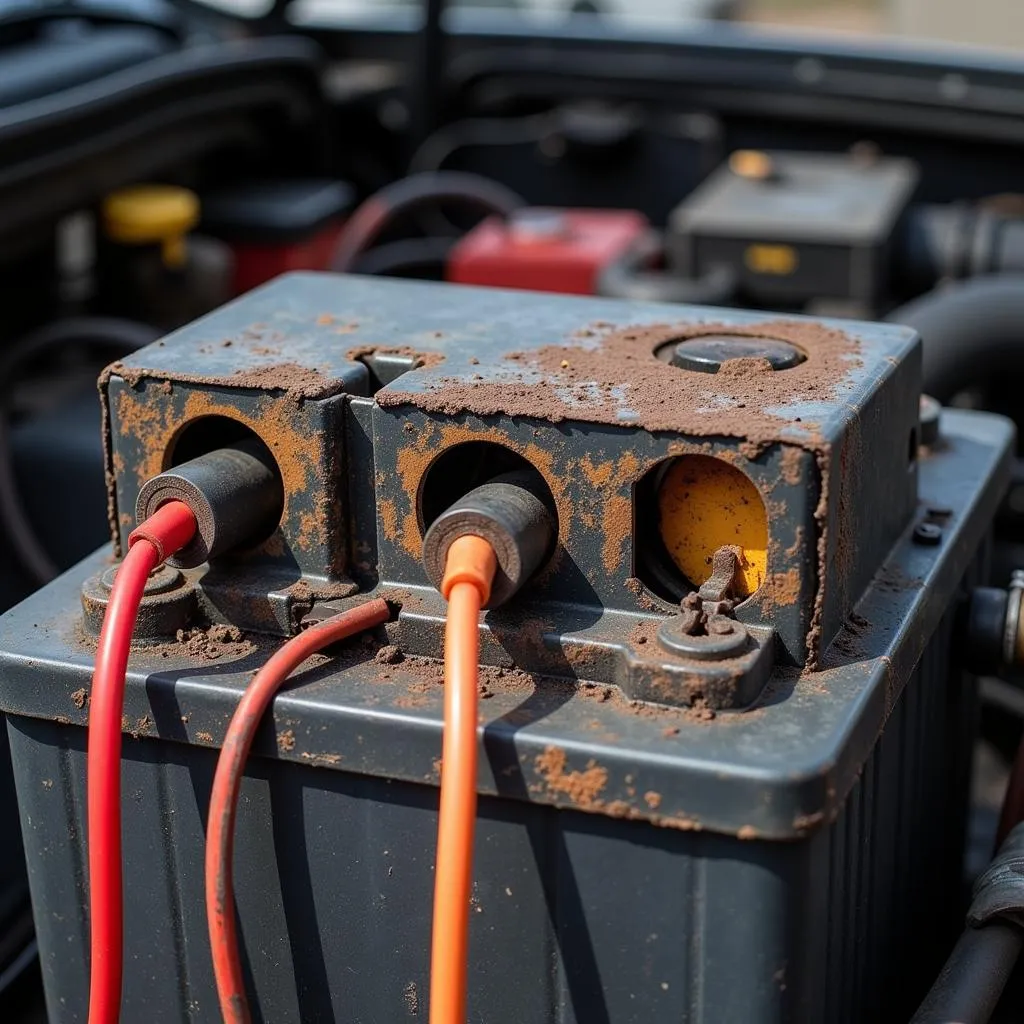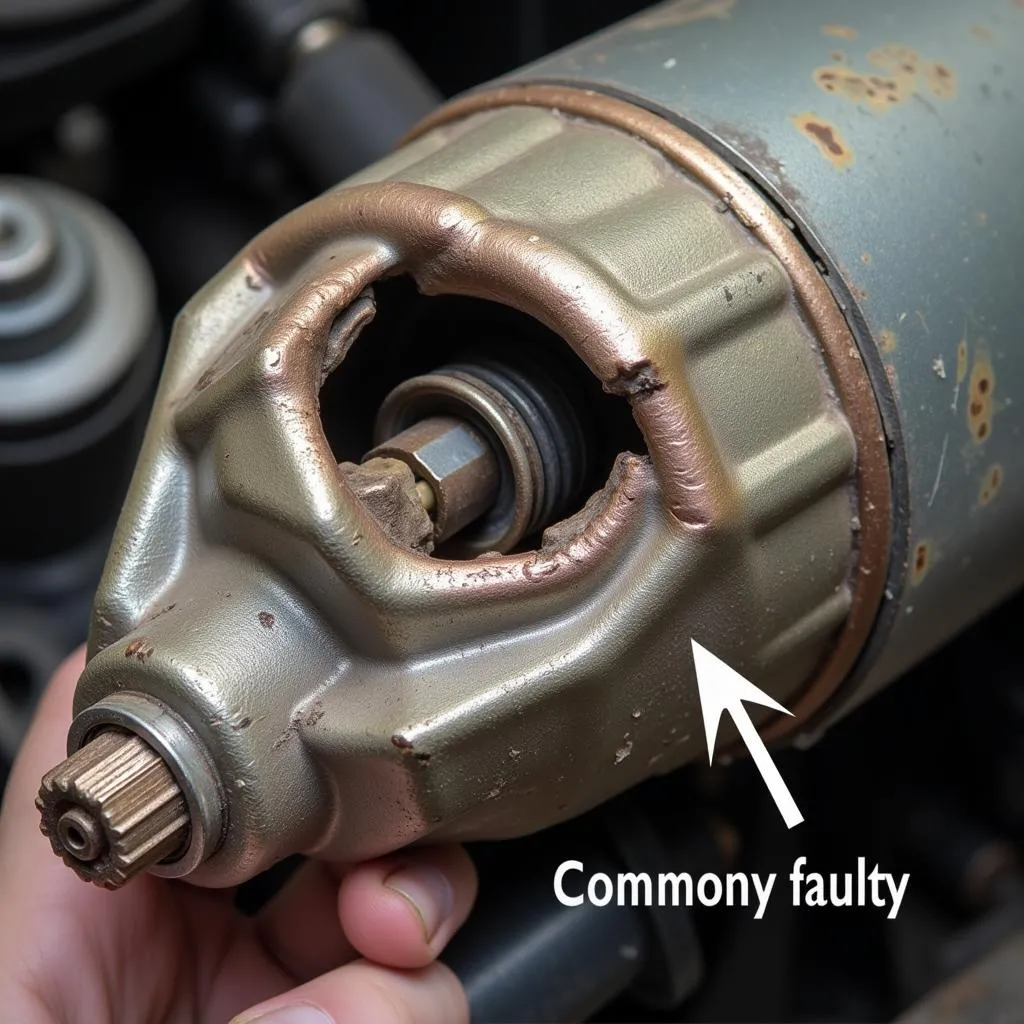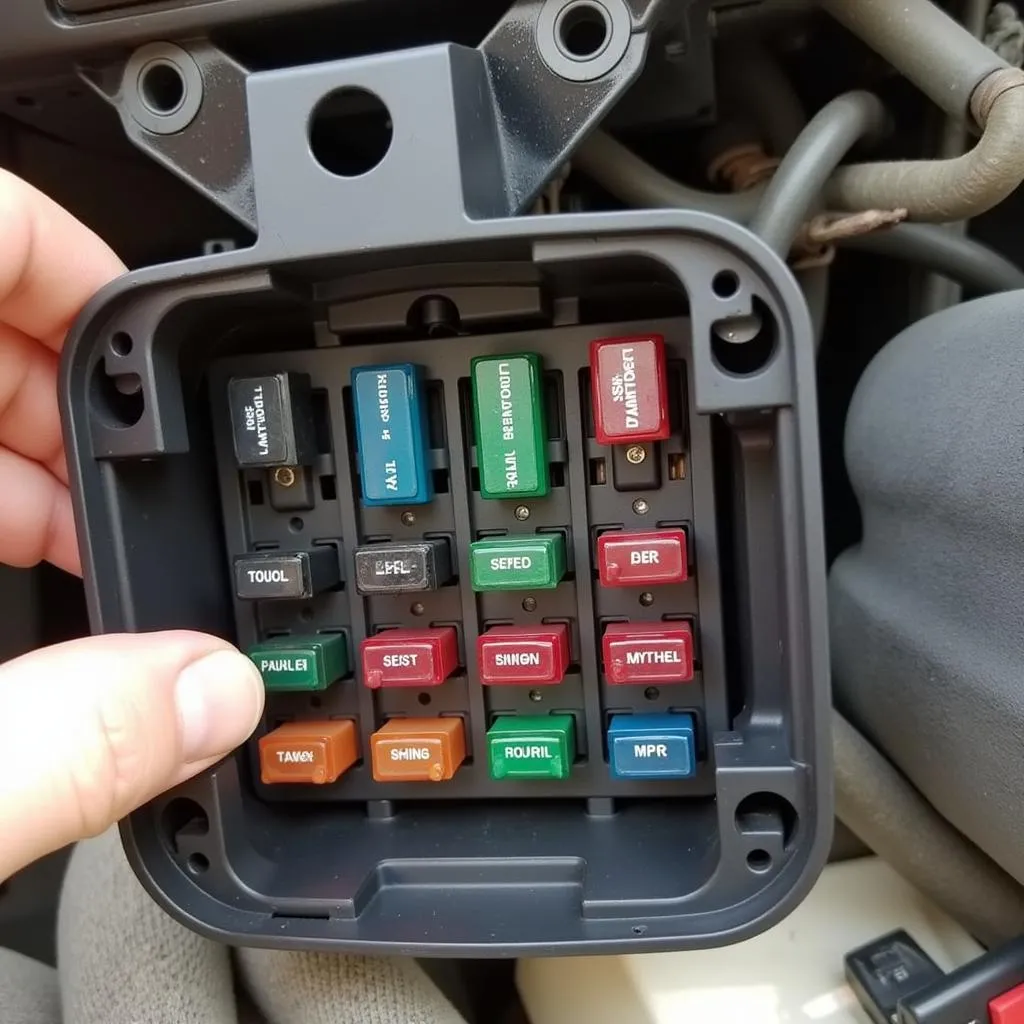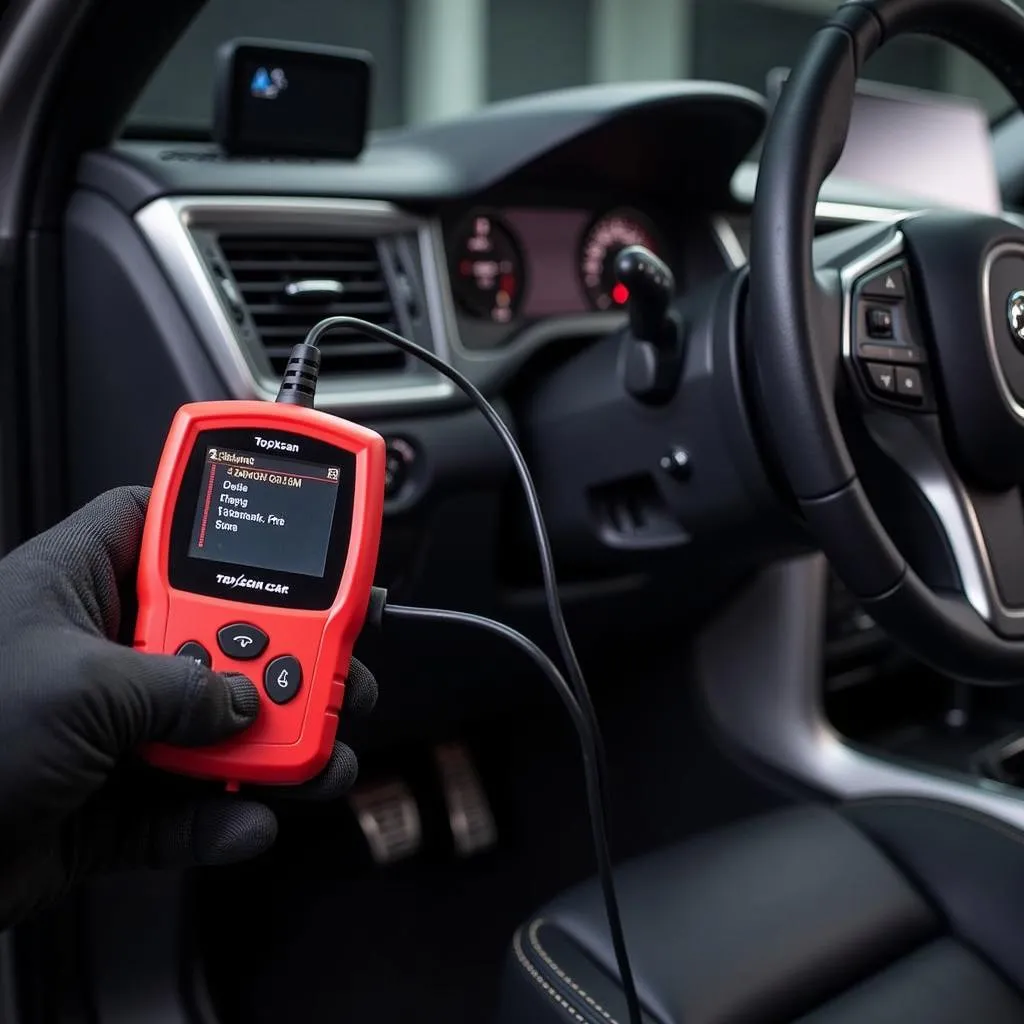Imagine turning your car key, expecting the engine to roar to life, only to be met with utter silence. This frustrating experience, often described as a “car completely dead when turning key,” can be caused by various issues, ranging from simple fixes to more complex electrical problems. This comprehensive guide will delve into the common culprits behind this issue and provide you with potential solutions to get your car back on track.
Why is My Car Dead When I Turn the Key?
There are several reasons why your car might be completely dead when you turn the key. Identifying the root cause is crucial for effective troubleshooting. Here are some of the most common culprits:
1. Dead Battery: The Usual Suspect
 Dead Car Battery
Dead Car Battery
A dead battery is often the primary suspect when your car won’t start. The battery provides the electrical current needed to power the starter motor, which cranks the engine. If the battery is drained, it won’t have enough power to engage the starter.
Common signs of a dead battery include:
- Dim headlights
- Slow cranking of the engine
- Clicking sound when turning the key
- Warning lights on the dashboard
You can test your battery using a voltmeter:
- Connect the red lead of the voltmeter to the positive (+) terminal of the battery.
- Connect the black lead to the negative (-) terminal.
- A reading of 12.6 volts or higher indicates a healthy battery.
- A reading below 12.4 volts suggests a weak or discharged battery.
Solution: Jump-starting your car using jumper cables and another vehicle or a portable jump starter can provide a temporary fix. However, a dead battery will likely need replacement to ensure reliable starting.
2. Faulty Starter Motor
 Faulty Starter Motor
Faulty Starter Motor
While a dead battery is a common cause, sometimes the issue lies with the starter motor itself. The starter motor is responsible for turning the engine over, allowing it to start. When you turn the key, the starter motor engages with the engine’s flywheel, initiating the combustion cycle. A faulty starter motor won’t be able to perform this function, leaving your car dead.
Signs of a faulty starter motor:
- A clicking sound when turning the key, but the engine doesn’t crank.
- The engine cranks very slowly, even with a fully charged battery.
- Grinding noise when attempting to start the engine.
Solution: If you suspect a faulty starter motor, it’s best to consult a qualified mechanic. They can diagnose the issue and advise whether repair or replacement is necessary.
3. Ignition Switch Problems
The ignition switch is the electrical gateway between your car key and the starter motor. When you turn the key, the ignition switch completes a circuit that sends power to the starter. A malfunctioning ignition switch can disrupt this process, preventing your car from starting.
Signs of a faulty ignition switch:
- Intermittent starting problems – sometimes the car starts, sometimes it doesn’t.
- The engine doesn’t crank, but the dashboard lights and accessories work.
- The key gets stuck in the ignition or is difficult to turn.
Solution: Diagnosing and repairing an ignition switch can be complex and may require specialized tools. Consulting a qualified mechanic is recommended for addressing ignition switch issues.
4. Bad Alternator: Beyond Just Starting
While a bad alternator might not be the immediate reason your car is dead when you turn the key, it’s crucial to understand its role. The alternator recharges the battery while the engine is running. A malfunctioning alternator will not charge the battery properly, eventually leading to a dead battery and a car that won’t start.
Signs of a bad alternator:
- Dim or flickering headlights, especially when accelerating.
- Warning light on the dashboard (battery or charging system warning).
- A whining or growling noise coming from the engine.
Solution: A failing alternator should be replaced as soon as possible to avoid being stranded with a dead battery.
5. Electrical Issues: Fuses, Wiring, and More
 Car Fuse Box
Car Fuse Box
The intricate network of wires, fuses, and relays in your car’s electrical system can sometimes be the culprit behind starting problems. A blown fuse, corroded wiring, or a faulty relay in the starting circuit can interrupt the flow of current, preventing the car from starting.
Signs of electrical issues:
- Blown fuses in the fuse box.
- Visible corrosion or damage to wiring.
- Intermittent electrical problems with other components.
Solution: Identifying and resolving electrical issues requires careful inspection and testing. While some electrical problems can be straightforward, others may require the expertise of a qualified mechanic.
What to Do When Your Car Won’t Start
Experiencing a car that’s completely dead when you turn the key can be stressful. However, staying calm and taking a systematic approach to troubleshooting can help you identify and address the issue:
- Check the Obvious: Ensure the gear shifter is in “Park” or “Neutral,” and the parking brake is engaged.
- Inspect the Battery: As a dead battery is a common culprit, start by checking for signs of corrosion on the battery terminals and loose connections.
- Listen Carefully: Pay attention to any sounds when you turn the key. Clicking, grinding, or whirring noises can provide clues about the source of the problem.
- Check for Warning Lights: See if any warning lights illuminate on the dashboard when you turn the key to the “On” position.
- Consider Your Surroundings: Think about where you parked your car. Extreme temperatures, like extreme cold or heat, can affect battery performance.
- Consult the Owner’s Manual: Your car’s owner’s manual often provides valuable troubleshooting information and fuse box diagrams.
Advanced Diagnostics with OBD2 Scanners
 OBD2 Scanner in Use
OBD2 Scanner in Use
For more complex car problems, an OBD2 scanner can be an invaluable tool. By plugging the scanner into your car’s OBD2 port, you can read diagnostic trouble codes (DTCs) stored in your car’s computer. These codes can provide valuable insights into the root cause of the starting problem. If you’re comfortable using an obd ii elm327 scanner and interpreting codes, it can help you narrow down the issue.
Prevention is Key: Maintaining Your Car’s Electrical System
Regular maintenance can go a long way in preventing starting problems and keeping your car’s electrical system in top shape. Here are some essential tips:
- Battery Care: Regularly clean battery terminals to prevent corrosion. Have your battery tested every couple of years and replace it if necessary.
- Visual Inspections: Periodically inspect your car’s wiring for signs of wear and tear, fraying, or damage.
- Regular Servicing: Follow your car manufacturer’s recommended maintenance schedule, including inspections of the starting and charging system.
When to Call a Mechanic
While some car starting problems can be simple DIY fixes, many require the expertise of a qualified mechanic. If you’ve exhausted basic troubleshooting steps, don’t hesitate to seek professional help. A mechanic has the knowledge, experience, and tools to diagnose and repair complex starting issues efficiently and effectively.
Conclusion
A car completely dead when turning the key can be a frustrating experience. However, understanding the common causes, basic troubleshooting steps, and when to call for professional help can save you time, money, and unnecessary stress. By staying proactive with car maintenance and addressing potential issues promptly, you can ensure your car starts reliably every time you turn the key.
FAQs
1. Can I jump-start my car with a dead battery every time it dies?
While jump-starting can provide a temporary fix, it’s not a sustainable solution. A dead battery likely needs replacement to ensure reliable starting.
2. How long does a car battery typically last?
Car battery lifespan varies depending on factors like climate and driving habits, but most batteries last between 3 to 5 years.
3. What should I do if my car still won’t start after replacing the battery?
If your car still won’t start after a battery replacement, the issue likely lies beyond the battery. It’s recommended to have a qualified mechanic inspect the starting and charging system.
4. Can a bad alternator prevent my car from starting?
While a bad alternator won’t directly prevent your car from starting initially, it will eventually lead to a dead battery, leaving you stranded.
5. Is it safe to drive my car with a failing alternator?
Driving with a failing alternator is not recommended. It can lead to a complete electrical system failure, leaving you stranded and potentially causing further damage to your car.
Common Car Won’t Start Scenarios
1. Clicking Sound, Engine Won’t Crank
This is often a sign of a weak or dead battery or a problem with the starter motor or its connections.
2. Dashboard Lights Up, Engine Doesn’t Crank
This could indicate a faulty ignition switch, starter relay, or a problem with the starter motor itself.
3. Engine Cranks Slowly
A slow cranking engine usually points to a weak battery that can’t provide enough power to turn the engine over quickly.
Need More Help?
If you are experiencing car troubles and need further assistance, we are here to help. Contact us via WhatsApp at +1(641)206-8880 or email us at [email protected]. Our dedicated team of automotive experts is available 24/7 to provide you with personalized support and guidance. You can also visit us at 276 Reock St, City of Orange, NJ 07050, United States, to discuss your car concerns in person. Let us help you get back on the road safely and quickly!